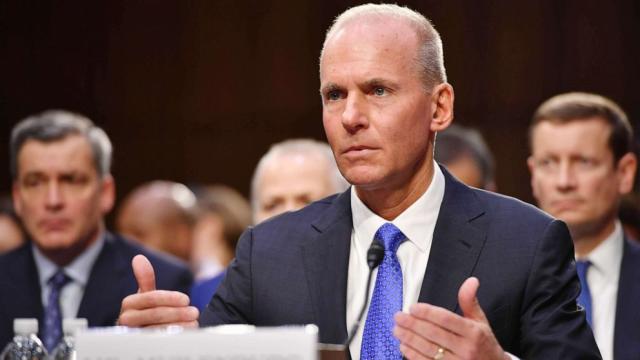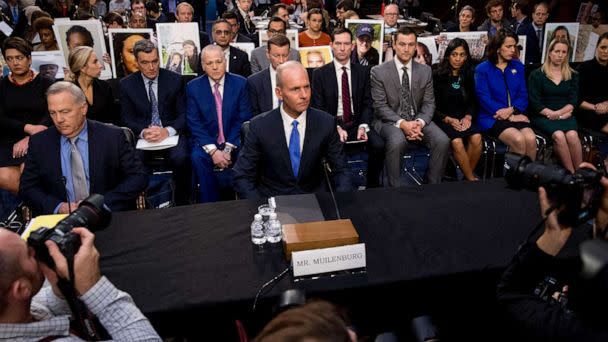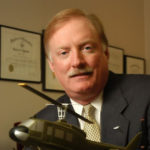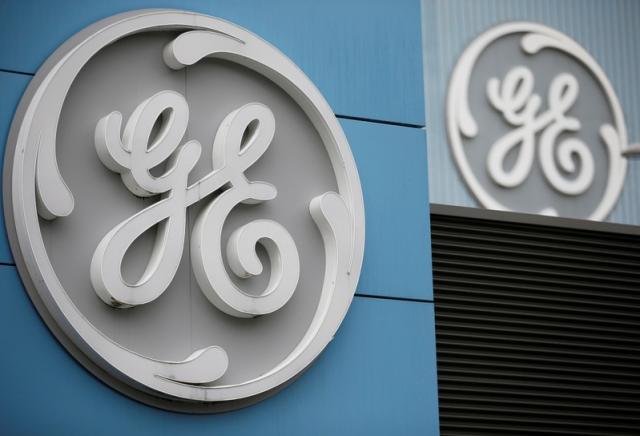737 Max Crashes: Boeing CEO Criticized for Lack of Pilot
Training, in Second Day of Testimony Dennis Muilenburg, chief executive officer of Boeing Co., speaks during a House Transportation and Infrastructure Committee hearing in Washington, D.C. regarding the two Boeing 737 Max crashes that killed 346 people. Lawmakers blasted Boeing and peppered its CEO on Wednesday with questions about the design and marketing of the 737 Max, the plane involved in two crashes that killed 346 people. House Transportation Committee Chairman Peter DeFazio, (D-Ore.), said Boeing showed a "lack of candor all through this." DeFazio and others on the panel highlighted Boeing's failure to tell pilots about a new flight-control system until after a Max crashed a year ago in Indonesia, and the recent disclosure a company test pilot raised alarms about the system in 2016. DeFazio and Rep. Steve Cohen, (D-Tenn.), also hammered CEO Dennis Muilenburg over his compensation, which rose last year to $23.4 million, including more than $13 million in extra incentive pay, according to a regulatory filing. Muilenburg explained changes Boeing is making in the Max and other steps it is taking to improve safety. He conceded the company "made some mistakes" in designing the flight system called MCAS, which pushed down the nose of the planes before crashes in Indonesia and Ethiopia. "We are learning, we still have more to learn, we have to work to do to restore the public's trust," Muilenburg said. Some members of the panel defended Boeing and the Federal Aviation Administration, which certified the plane. The committee's top Republican, Sam Graves of Missouri, said he wasn't absolving Boeing of mistakes but suggested foreign pilots were partly to blame. Graves noted the safety record of U.S. aviation-no fatal crashes since 2009-and a preliminary report on the second Max crash, which revealed the Ethiopian Airlines pilots were flying so fast it might have hindered their ability to overcome an MCAS malfunction. "I guess we're going to have to start building airplanes to the lowest common denominator...if we're going to export" planes, Graves said. The Transportation Committee has been investigating Boeing and the FAA for months, securing about 500,000 pages of documents, some of which they displayed at the hearing. The committee learned of a manager who said assembly-line workers were being pushed too hard to churn out 52 of the 737s a month in 2018, and he urged that production be stopped. He said he was hesitant to put his own family on a Boeing plane. Muilenburg said the manager, who has since retired, "raised some good concerns" that the company has addressed. However, Boeing didn't reduce the production rate until this April, when the grounding of the Max halted deliveries of new Max jets. Muilenburg's appearance before the House panel came a day after he testified to a Senate committee. He was criticized by senators over several issues, including failing to tell Congress and regulators about a senior test pilot's messages that seemed to raise alarms the new flight-control system. Boeing has been spending months revising MCAS, tying it to an additional sensor at all times and making it less powerful. The company hopes to win approval before year-end from the FAA to get the Max back in the air. Regulators in other parts of the world have indicated they may take longer to review Boeing's changes to the plane. After the hearings, Congress is likely to consider changes in how the FAA certifies new planes. https://fortune.com/2019/10/30/737-max-crashes-boeing-ceo-grilled-in-house-hearing-for-lack-pilot-training-mcas-flight-system/ Back to Top |
When asked if he'll resign in light of 737 MAX crashes,
Boeing CEO says 'that's not where my focus is' When asked if he'll resign in light of 737 MAX crashes, Boeing CEO says 'that's not where my focus is' originally appeared on abcnews.go.com Boeing CEO Dennis Muilenburg faced tough questions from lawmakers on Tuesday during his first appearance on Capitol Hill following the two crashes involving the 737 MAX jet that killed 346 people, including if he will or will not resign. "I'm focused on the job at hand. And I came to Boeing, because we care about building safe airplanes for the world. That's what it's always been about," Muilenberg said Oct. 29, before the Senate Committee on Commerce, Science and Transportation. "These two accidents occurred on my watch. And I have a keen sense of responsibility to see that through." Muilenberg brushed off the question on whether he will resign, adding "that's not where my focus is. My focus is on the job at hand focused on safety. And we're going to do everything we can ensure safe flight." The issue at hand highlights one argument from lawmakers that Boeing prematurely certified the aircraft before the pilots were fully trained on the newer MCAS automation system. Ranking Member Sen. Maria Cantwell pushed the CEO, asking why the company looks to have put profit over aviation safety. "We cannot have a race for commercial airplanes become a race to the bottom when it comes to safety," Cantwell, D-Wash., said. "The company cannot prioritize profits over safety. Safety always has to be job number one." Muilenburg reiterated that he was made aware of documents earlier in the year, and at that point he counted on his council to handle appropriately. After reviewing messages between technical pilots Patrik Gustavvson and Mark Forkner, Texas Sen. Ted Cruz took the issue a step further, calling out Boeing's leadership for potentially lying to regulators. "How in the hell did nobody bring this to your attention?" Cruz asked Muilenburg. "How did you just read this a couple weeks ago?" Muilenburg said he's not sure what Forkner meant in the exchange.  PHOTO: Survivors of those killed in the Ethiopian Airlines Flight 302 and Lion Air Flight 610 crashes hold photos of their family members behind Dennis Muilenburg, center, and John Hamilton, left, on Capitol Hill in Washington, Oct. 29, 2019. (Andrew Harnik/AP) GOP Chairman Sen. Roger Wicker, from Mississippi, and Cantwell alike grilled Muilenberg on how the company let this happen and what they've done to ensure it doesn't happen again. "It's something that we've spent a lot of time thinking about over the last ... over the last year. We have a keen sense of responsibility. We're responsible for our airplanes. And any accident, any accident with one of our airplanes is not acceptable," Muilenburg said in his testimony. "And we reviewed both of these accidents, we know what needs to be fixed. We own that. We have a responsibility to do that. We know we made mistakes and got some things wrong. We own that, and we are fixing them." He added, "We're never going to stop focusing on safety and continuously improving." Muilenburg laid out the plan for Boeing's improvements to the now grounded 737 MAX. "We're confident with the updates that we're making that once the MAX returns to the skies, it'll be one of the safest airplanes ever fly," he said.  PHOTO: Sen. Richard Blumenthal in the Hart Senate Office Building on Capitol Hill in Washington, D.C., Oct. 29, 2019. (Mandel Ngan/AFP via Getty Images) Still, some lawmakers were less than impressed with the CEO's response to the crashes. Connecticut Sen. Richard Blumenthal highlighted an email from Forkner, the chief technical pilot for the Boeing 737 MAX, where it showed Muilenburg's awareness that Boeing didn't include a reference to the MCAS system in the aircraft operating manual. "Boeing came to my office and said this was the result of pilot error, those pilots never had a chance, victims never had a chance, they were in flying coffins," Blumenthal said. Muilenberg said the decision to not include a reference in an operating manual is not determined by one individual. Blumenthal added, "Would you agree that this system over oversight is broken? That's the lesson here, isn't it?" "My anger has only grown" Blumenthal said, asking victims to hold up photos of their loved ones that were lost. "Loved ones lost lives because of an accident that was preventable, that was the result of a pattern of deliberate concealment." The National Transportation Security Board issued and identified three major suggestions during their investigation, including issues related to alerts, system improvements and reaction to alarms. NTSB Chairman Robert Sumwalt told lawmakers that it was clear the MCAS was not working and they sent out an advisory -- which included the impact multiple flight deck alerts could've had on the pilot's responses. However, the alerts weren't considered explicit enough. House Transportation and Infrastructure Committee Chair Rep. Peter DeFazio, D-Ore., told ABC News that he will ask Muilenburg why Boeing did not identify issues "before the plane ever flew" during the House Committee hearing on Wednesday. The committee intends to focus on production pressures inside Boeing, pilot training requirements, concealing data from regulators and FAA oversight, according to a committee spokesperson. DeFazio says the committee has received as part of its investigation "report after report about production pressures" inside Boeing. "I fear that profit took precedence and put pressure on the whole organization all the way down," DeFazio said in an interview with ABC News' Senior Transportation Correspondent David Kerley. Boeing's safety culture has been under increased scrutiny since messages surfaced two weeks ago in which Forkner told another pilot that the MCAS flight control system was "running rampant" in a simulator session. The Maneuvering Characteristics Augmentation System (MCAS) is a software feature introduced in the 737 MAX so that it feels and flies like previous models, according to Boeing. Reports from investigators indicate that the misfiring of MCAS repeatedly pushed the planes' noses down during the fatal Lion Air and Ethiopian Air crashes. Other documents released by the House Committee show Forkner told Federal Aviation Administration officials that MCAS was safe after calling it "egregious" based on simulator tests, according to internal messages and emails. In regards to areas like pilot training and manual recommendations, Forkner was the main point of contact between the FAA and Boeing, an FAA official explained. Boeing's goal was for the transition to be so seamless from their old plane, the 737 Next Generation, to the 737 MAX that it would not require any additional simulator training for pilots. Boeing said in a statement that Forkner was not referring to the MCAS system in the internal messages, but that "his comments reflected a reaction to a simulator program that was not functioning properly, and that was still undergoing testing." Lawmakers and regulators say they initially did not have access to these internal messages. After receiving them, the FAA said in a statement that it found the messages disturbing and that it was "disappointed that Boeing did not bring this document to [their] attention immediately upon its discovery." The same day that the messages and emails were released, DeFazio sent a letter to U.S. Secretary of Transportation Elaine Chao saying the "messages indicate that Boeing withheld damning information from the FAA, which is highly disturbing." DeFazio said the concealment of information could lead to criminal charges. "I would say deliberate concealment would be a criminal act," DeFazio said. "We can't say that it was deliberately concealed definitively at this point." But DeFazio said that he is focusing on what he does know, which is that the aircraft certification policy needs to change. Under the Organization Designation Authorization (ODA) program mandated by Congress, some of the certification process is delegated to manufacturers like Boeing. Critics of the ODA program say it's a conflict of interest that Boeing was able to influence the certification of the 737 MAX. However, some defend the program and say that there is sufficient FAA oversight from start to finish during the aircraft certification process. In 2003, DeFazio voted against the initial bill that mandated the ODA program. "The system is going to change," DeFazio said. Joint Authorities Technical Review Slams FAA Boeing Max8 Certification Process JAMES T. CROUSE  On October 11, 2019, the Joint Authorities Technical Review (JATR) consisting of representatives from the FAA, NASA, and Civil Aviation Authorities (CAA's) from Australia, Brazil, Canada. China, Europe, Indonesia, Japan, Singapore and the UAE, submitted its report to the FAA's Associate Administrator for Aviation Safety. In short, it is a broad condemnation of the FAA's aircraft certification process and its twelve recommendations call for a wholesale review and modification of the entire certification process. Its recommendation are meaningful and timely; the FAA should embrace the report and adopt all of the recommendations. In a single sentence in his cover letter accompanying the report, Christopher Hart, former NTSB chair and Chairman of the JATR, summed up what many of us in aviation have known for years. After noting that systems have become more complex and making it more likely regulations and standards would not address every conceivable scenario, Hart stated: "To the extent that they do not address every scenario, compliance with every applicable regulation and standard does not necessarily ensure safety." (emphasis added). The Report continued to suggest that the Organization Designation Authorization Program, or ODA (interesting changed acronym from its previous "DOA"), the program by which the FAA grants the manufacturer/designer, in this case Boeing, authority over the certification project, is weak due to inadequate CAA oversight. The JATR team concluded that FAA resources fall short which may have contributed to an "inadequate number of FAA specialists being involved in the B737 MAX certification program." In short, the FAA was incapable to oversee Boeing's activities due to a lack qualified engineers and technical expertise. Specifically, as to the highly problematical and deadly Maneuvering Characteristics Augmentation System (MCAS), the reported stated that the FAA "had inadequate awareness of the MCAS function which, coupled with limited involvement, resulted in the inability of the FAA to provide an independent assessment of the adequacy of the Boeing proposed certification activities associated with the MCAS." This inadequacy, coupled with the Boeing test pilots' failure to be candid with the FAA when they encountered problems with the MCAS system during flight simulator tests (addressed in a subsequent article), made it almost certain that the FAA would not discover the fatal flaws in the MCAS. Of the many findings and recommendations made by this panel, none is more important than its emphasis on a holistic aircraft certification process. Given the complexity of modern aircraft, it is important that any modification be evaluated in relation to the entire aircraft. A change to one components or system can have unintended and dramatic consequences to the aircraft system as a whole. Hence, no more piecemeal alterations looking solely at that particular aspect of the aircraft and no more layer upon layer of changes to an already existing, sometimes much older platform that in some cases bears little relation to the original type-certificated model. Other certification aspects addressed in the report include making sure that all operational aspects of design changes are considered in operations and training, the different operating environments between manufacturer engineering test pilots and operational test pilots, post-certification follow-up and monitoring of design changes.  James T. Crouse James T. Crouse has been a pilot for thirty-two years, during which time he has performed as a U.S. Army aircraft maintenance officer, maintenance test pilot, and research and development test pilot. Mr. Crouse has litigation experience involving major air carriers, general aviation, helicopter, and military crashes, as well as non-aviation mass disaster litigation. GE still sees $1.4 billion cash cost from Boeing 737 MAX grounding in 2019  FILE PHOTO: The logo of U.S. conglomerate General Electric is seen on the company building in Belfort NEW YORK (Reuters) - General Electric Co still expects the grounding of Boeing Co's 737 MAX jetliner to reduce its cash flow by $1.4 billion in 2019, provided the aircraft remains grounded all year, GE Chief Executive Larry Culp said during a conference call on quarterly earnings on Wednesday. GE and French partner Safran SA make engines for the jet. "As we think about 2020, I think we're going to try to follow Boeing's lead here," Culp said, responding to an analyst question. "When we talk about the full-year cash headwinds this year due to MAX, that, obviously, assumes that we don't see a return to service this year," he said. He added the forecast is conservative. GE's chief financial officer, Jamie Miller, said GE still expects "the year to be impacted to the tune of about negative $1.4 billion." She said it was "difficult to predict" the financial impact on GE in 2020 and beyond. Boeing has said it expects the jet to clear approval by U.S. regulators by year-end. Global aviation regulators grounded the jet after a second fatal crash last March. |



Ingen kommentarer:
Legg inn en kommentar
Merk: Bare medlemmer av denne bloggen kan legge inn en kommentar.